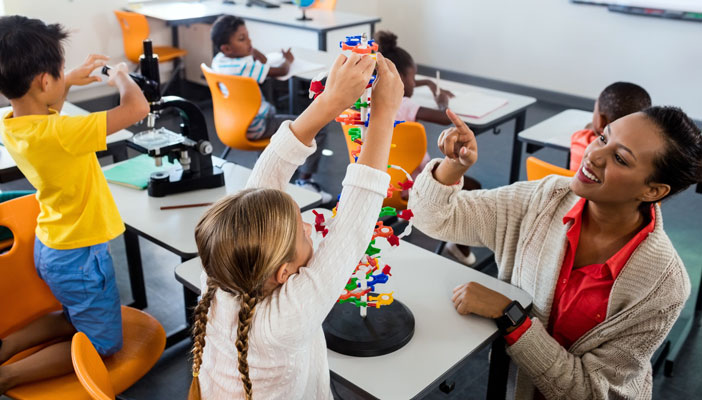Early childhood education programs are vital in nurturing a child’s growth and development during their formative years. These programs provide a stimulating and enriching environment that fosters cognitive, social, emotional, and physical development. Parents can ensure that their child receives the necessary support and guidance to thrive by enrolling a child in a high-quality childcare program.
Nurturing your child’s growth and development is the primary focus of these programs. They recognize that the early years of a child’s life are crucial for laying the foundation for future learning and success. Through a carefully designed curriculum and skilled educators, these programs aim to unlock a child’s full potential and prepare them for challenges.
Cognitive Development
Little minds blossom as they playfully explore early literacy, math, problem-solving, and critical-thinking skills. Teachers tap into each child’s interests to make learning feel like fun. Step by step, vital cognitive abilities take root.
Preschool teachers employ age-appropriate activities, games, and interactive lessons to engage children’s curiosity and encourage exploration. Through hands-on experiences and play-based learning, children develop essential cognitive abilities that will serve as the building blocks for future academic success.
Social and Emotional Growth
In addition to cognitive development, an early childhood education program prioritizes social and emotional growth. Children learn to interact with their peers, share, cooperate, and develop empathy—essential skills for navigating the social landscape.
It’s not just brain power; these programs nurture the whole child. They get support, understand feelings, and resolve conflicts in positive ways. Self-confidence blossoms in this safe, supportive space.
Physical Development
Physical development is another crucial aspect addressed in the early childhood curriculum. Children engage in various physical activities that promote gross and fine motor skills, coordination, and overall health.
Recess, music, and movement activities get those wiggly bodies engaged, too! Kids develop coordination, motor skills, and healthy exercise habits. The playgrounds and gyms are like vibrant candy lands made for energetic play.
Cultural Exposure
Furthermore, early childhood education programs often incorporate diverse cultural experiences, exposing children to different languages, traditions, and perspectives. This exposure fosters an appreciation for diversity and lays the foundation for becoming responsible and respectful global citizens. Seeds of respect and global understanding take root because of this immersion.
Nurturing Creativity and Imagination
Early childhood educators provide ample opportunities for children to explore their creativity and imagination. Children learn to express themselves, think outside the box, and develop problem-solving skills through art, music, storytelling, and dramatic play. These experiences foster a love for the arts and enhance cognitive abilities, self-expression, and confidence.
Creativity and imagination ignite children’s problem-solving abilities and self-assurance. The arts tap into something magical within.
Establishing a Lifelong Love for Learning

One of the most significant impacts of early childhood programs is their ability to instill a lifelong love for learning in children. Creating a positive and engaging learning environment helps children develop a natural curiosity and enthusiasm for acquiring new knowledge and skills. This foundation is invaluable as children transition into formal education and beyond, setting them on a path of continuous growth and intellectual development.
Parental Support and Resources
The benefits of early childhood education programs extend beyond the child’s immediate development. Parents and families also benefit from the support and resources provided by these programs. Many offer parenting workshops, family engagement activities, and opportunities for parents to connect with other families, fostering a sense of community and providing valuable insights into their child’s growth and development.
Monitoring Growth and Development
Teachers and families become partners in reaching milestones and identifying where children may need extra support along the way. This individualized approach ensures no child gets left behind.
Regular assessments and observations help identify areas of strength and areas that may require additional support. Individualized attention and tailored approaches ensure that each child’s unique needs are met, fostering a sense of belonging and promoting overall well-being.
Choosing the Right Program
It’s important to note that not all early childhood curricula are created equal. When choosing a program, parents should consider factors such as the program’s philosophy, curriculum, teacher qualifications, student-to-teacher ratios, and overall environment. High-quality programs typically employ experienced and dedicated educators, maintain a nurturing and stimulating environment, and follow evidence-based practices in early childhood education.
Preparing for Future Success
Early childhood education programs also play a crucial role in preparing children to transition to formal schooling. By developing essential skills, confidence, and a love for learning, these programs equip children with the necessary tools to navigate the academic and social challenges that lie ahead. The experiences and knowledge gained during these formative years serve as a solid foundation for future success in school and life.
Conclusion
Investing in early childhood education is an investment in a child’s future. These programs provide a nurturing and enriching environment that supports children’s holistic development, equipping them with the skills, knowledge, and confidence necessary for lifelong success.









